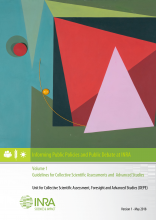Reading time 1 min
According to what principles does INRAE conduct a collective scientific expert report or study?
Published on 22 June 2018

The role of public research organisations in supporting public policy is reflected in various actions, all based on the results of scientific research. Before public policies can be developed and in order to understand issues and the agronomic, biological, environmental, economic and social phenomena on which public action is intended to intervene, decision-makers and all stakeholders need to be provided with a review of the available scientific knowledge, not overlooking that which could be described as acquired, uncertain, insufficiently documented or incomplete. This is the very principle of the collective scientific assessments (known by the French initials ESCo) conducted by INRAE. Complementary approaches such as advanced studies and foresight work are intended to deepen or extend these knowledge bases in order to make them even more intelligible and usable in the reflections of various actors working on public policies.
This work requires the definition and implementation of a rigorous and shared methodology
between all stakeholders in accordance with the National Charter on Institutional Scientific Expert Reports that INRA, like its partners in public research, signed in 2011. This methodology aims to ensure the credibility, legitimacy and relevance of the scientific elements provided through this intermediary to the public debate and made available to public and private decision-makers.

Contents:
- Instruction, governance and monitoring of ESCo and studies
- Constitution and roles of ESCo and study working groups
- Creation and use of documentary corpuses in ESCo and studies
- Deliverables process and dissemination of ESCo results and studies
- Reference document: management and conservation of DEPE’s archives
